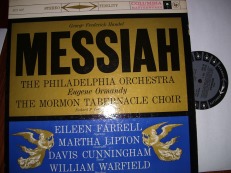 There are so many versions of The Messiah the it rather rejects criticism, but there is still one that rises above all: Ormandy’s classic 1959 Philadelphia performance with the Mormon Tabernacle. The sound, on my first pressing 6-eyes is astounding, besting anything I’ve heard on later digital work, CD or vinyl. The richness and depth of sound is unsurpassed.
There are so many versions of The Messiah the it rather rejects criticism, but there is still one that rises above all: Ormandy’s classic 1959 Philadelphia performance with the Mormon Tabernacle. The sound, on my first pressing 6-eyes is astounding, besting anything I’ve heard on later digital work, CD or vinyl. The richness and depth of sound is unsurpassed.
That said, I was wedded to this recording until I discovered Raymond Leppard’s 1975 English Chamber Orchestra recording with Erato (my pressing is a special club issue, in an EMI German licensed pressing). The Leppard performance is straightforward and passionate, if not as vivid as the Philadelphians. It was also recorded in quadraphonic sound, providing a surround-sound experience that reproduces in wonderful form. In performance, it comes out a bit dainty compared to Ormandy’s opulence, which is how some of us liek to hear this work performed. Still, spread out over three discs as opposed to the usual two, Leppard gives us a spaciousness to the sound that lacks in many other contemporary recordings. None of which is reproduced on compact disc.
All of this said, Ormandy takes the day. Whether in the Hallelujah chorus or otherwise, the sheer enthusiasm of the band is infectious. One can have a direct, authentic performance as with Leppard, but Ormandy finds something more, bigger and louder and more magnificent. Even if it was recorded in 1959.

January 11th, 2013 at 11:17 pm
Hello. I follow both your music and political blogs. I purchased the Ormandy/Messiah on your recommendation. I enjoyed the recording, but for a big band type performance, I greatly prefer Klemperer. The Philharmonia Chorus puts the Mormons to shame. I urge you to give Klemp a try. Regards, Todd
January 11th, 2013 at 11:44 pm
Thanks for your comment…I have indeed heard the Klemperer, on disc, and while I like his earlier recordings, find that with many directors in his older age the tempi slowed and energy was lacking in performances; compare his 1950s Beethoven to the later stereo set, for example. Glad you at least sampled the Ormandy and may grow into it!
January 12th, 2013 at 12:19 am
I agree, Klemperer’s mid-50’s mono versions of Beethoven’s symphonies 3, 5 and 7 do have much more vitality than the later 60’s versions. Though tempos do slow, many of Klemp’s later recordings are worth exploring. Todd